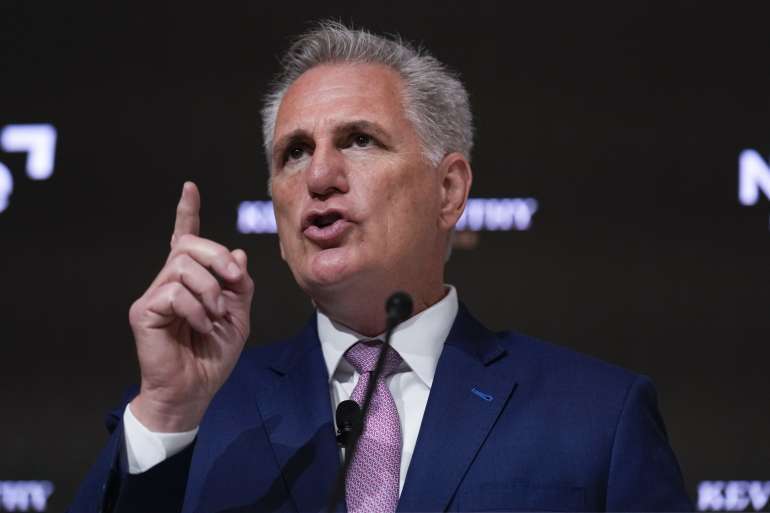GOP’s debt-limit plan would gut Biden’s climate law. White House’s response: ‘Jobs’

McCarthy is eyeing to pass his plan in the House next week, setting up a showdown with Democrats amid worries that the U.S. could default on its debt as early as June. The cuts, McCarthy said Wednesday, “will end the green giveaways for companies that distort the market and waste taxpayers’ money.”
The Republicans’ 300-page-plus bill amounts to a legislative wish list of measures that have no future in the Senate, whose Democratic leaders have joined Biden in refusing to negotiate policy changes as part of the debt ceiling. They argue that lawmakers should raise the borrowing cap — and avert global economic havoc — without conditions, as Congress repeatedly did under former President Donald Trump.
Biden derided McCarthy’s plan during an appearance Wednesday in Maryland, and vowed to reject GOP demands that he roll back his administration’s accomplishments.
“They’re in Congress threatening to undo all the stuff that you helped me get done,” Biden said during an appearance at a Maryland union hall. “You and the American people should know about the competing economic visions of the country that are at stake right now.”
A White House memo Thursday made that case more caustically, pointing to estimates that the IRA is fueling a boom in clean-energy, battery and electric vehicle jobs across the country — chiefly in the congressional districts of Republicans who voted against the law.
“‘Let me kill over 100,000 manufacturing jobs — mostly in red states — or I’ll force America to default on bills we racked up and trigger a recession,’ is the opposite of a compelling message,’” deputy press secretary Andrew Bates wrote in a memo that the White House provided to POLITICO. (USA Today has earlier reported on the memo.)
A POLITICO analysis early this year found that about two-thirds of the major clean energy projects announced since the IRA’s enactment in August were in GOP-held districts.
The GOP bill would enact the party’s marquee energy bill, H.R.1 (218), which the House already passed last month. That bill includes an easing of permitting rules for new energy infrastructure and mining projects that Republicans say would promote economic growth, and which might find some appeal among Democrats.
The Republican proposal also includes more partisan elements of their energy bill, which would mandate more oil and gas lease sales on federal lands, ease restrictions on natural gas exports, and repeal a fee that the IRA imposed on methane emissions from oil and gas operations.
Republicans have lambasted the IRA’s clean energy incentives, saying they’re wasteful and distort markets.
“These spending limits are not draconian,” McCarthy said in a Wednesday floor speech ahead of the bill release. “They are responsible. We’re going to save taxpayers money.”
Republicans are seeking to repeal the IRA’s zero-emission nuclear power production, clean hydrogen and sustainable aviation fuel tax credits. Their bill would also eliminate the law’s bonus provisions aimed at placing solar and wind facilities in low-income communities and that allow some entities to receive direct payments of the credits.
“We have to create situations where traditional, reliable, resilient energy can compete in the marketplace,” Rep. Kelly Armstrong (R-N.D.) told POLITICO. “If that’s getting rid of some of the crazy renewable tax credits in the IRA, I am all for it.”
Republicans are also proposing to modify several other existing tax credits under the law, including by reestablishing the previous investment and production tax credits for solar and wind that the IRA had extended and increased. The GOP would nix both the production and investments tax credits for green sources after 2024, as well as incentives for paying prevailing wage, using domestic content and placing facilities in communities historically dependent on fossil fuels.
The proposal would eliminate changes to some tax credits that existed before Democrats’ IRA was enacted, including for carbon sequestration.
And it would make major changes in the IRA’s electric vehicle tax credit, whose implementation by the Biden administration has taken bipartisan criticism. The GOP proposal would revive a prior $7,500 tax credit for qualifying electric vehicles, but would restore that tax break’s per-manufacturer limit of 200,000 vehicles. It would entirely repeal the IRA’s new incentives for critical battery minerals that are extracted from the U.S. or a close trading partner, and for batteries manufactured or assembled in North America.
While some moderate Republicans called for party leaders to place a priority on policy measures that could draw bipartisan support — such as overhaul permitting rules — as part of the debt ceiling package, conservatives pushed for more partisan measures targeting Democrats’ climate law.
But that could put some Republicans in a tricky spot, because many projects that could receive the IRA’s tax credits are set to be built in congressional districts represented by GOP lawmakers. Recent analysis from the American Clean Power Association found that there have been $150 billion in new clean power capital investments since the law’s August passage, including 46 utility-scale solar, battery and wind manufacturing facilities or facility expansions.
Of the manufacturing announcements tracked by ACP where a congressional district was known, the majority of those facilities were in red districts.
“There is a lot of stuff in the Inflation Reduction Act that should be repealed,” Rep. Jeff Duncan (R-S.C.) told POLITICO. “But there is some common sense stuff that was in there as well.”